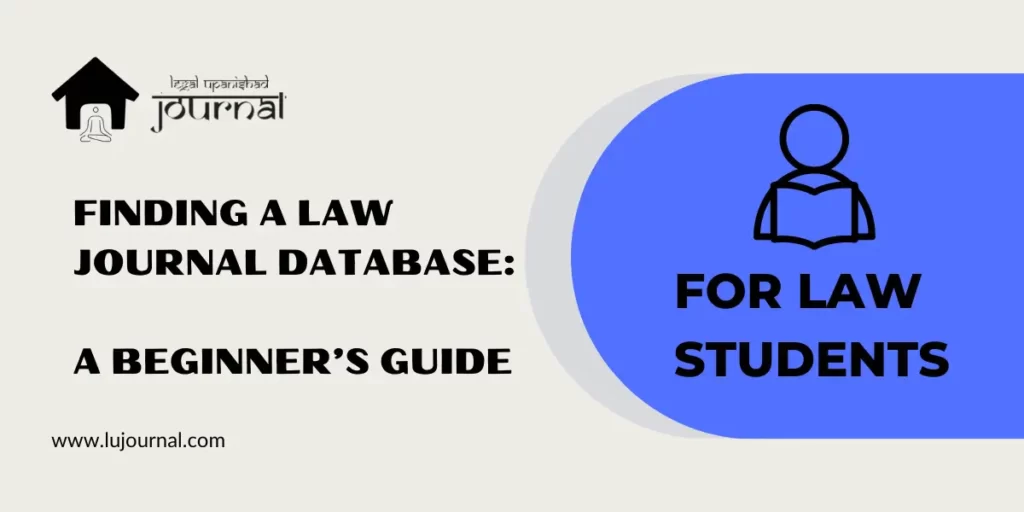This article on ‘Finding a Law Journal Database: A Beginner’s Guide’ is a guide for law students. Are you willing to submit a paper for publication in a Journal? Check the Submission Guidelines.
Table of Contents
Introduction
To begin the journey of finding a law journal database, it is essential to understand the nature of law journal databases. Finding the Law Journal database is crucial work as it provides access to a wealth of authoritative and scholarly content. It comprises comprehensive coverage of legal topics and helps to stay up to date with legal developments.
Prior to exploring the approach to discovering a law journal database, it is crucial to get familiar with the concept of law journal databases. This article serves as a beginner’s guide for those seeking to find diverse law journal databases for conducting legal research.
What is Law Journal Database?
A law journal database comprises a collection of research papers, review articles, and analyses laid down by legal professionals, academics, and field experts, providing a wealth of knowledge in the world of law. While many law schools publish law journals, this category of legal periodicals also encompasses publications from bar associations and other legal organizations.
Law journal articles, often referred to as law reviews, are in-depth scholarly pieces crafted by field experts, covering a wide range of legal subjects. It covers a broad spectrum of legal topics and subfields. With the help of this database, researchers can access a wide range of legal perspectives and stay informed about developments across different legal subjects.
Why do we need a Law Journal Database?
Litigants who are mindful of the importance of thorough case preparation often delve into multiple judgments and citations to gain a comprehensive understanding of the various aspects to be considered. However, young lawyers and law students often lack awareness of the appropriate approach to access these citations and judgments. There are several approaches that a beginner may take while finding the law journal database.
The Law Journal database is required for the given following reasons –
- Access to legal Precedents: Precedents are decisions laid down by the court previously that has established principles and interpretation. The Law Journal database provides a vast collection of legal proceedings. By referencing these judgments, legal professionals can gain insights into how comparable cases were previously adjudicated.
- Understanding Legal Interpretations: Legal Journal Database consists of various insights into the interpretation and applications of rules and regulations of courts. It offers various methods that have been used to interpret various laws and in-depth analysis, which enables legal professionals and law students to gain a profound understanding of the fundamental legal principles and doctrines.
- Research and Case Preparation: It acts as atool that helps in legal research and the preparation of various cases.
- Staying Updated with Legal Developments: Law Journal Database is constantly updated with new court decisions. Legal professionals and law students can stay abreast of the latest legal developments and changes in legal interpretation by regularly accessing this database.
- Building strong arguments: Lawyers can build strong legal arguments based on precedents and established legal principles by referring to this database. It helps lawyers Identify key legal authorities, assess the persuasiveness of previous decisions, and craft compelling arguments which are also supported by judicial reasoning.
Finding a Law Journal Database that suits your needs
A beginner in pursuit to find the law journal database must take efficient steps to find and use the law journal database. By following the steps outlined below, beginners can effectively locate and utilize law journal databases to enhance their legal research:
- Determine Research Needs: To begin with, it is crucial to bring out the research needs and objectives. Clarity of legal topics, jurisdictions, and desired level of information is essential. This essential feature will help in finding the most relevant law journal database.
- Utilize Academic Platforms and Libraries: Academic institutions typically serve as the primary sources for law journal databases. Notable platforms like LexisNexis Academic, Westlaw, HeinOnline, and JSTOR provide access to vast collections of law journals. This platform is usually available through academic institutions or libraries.
- Utilize Online Research Platforms: Online legal research platforms provide advanced search features and additional tools to enhance research capabilities. There are several online legal platforms that provide legal journal database some of which are, Bloomberg Law, Westlaw Edge, and Fastcase they provide a wide range of subscriber-based platform which consists of various legal material and law journals.
- Consider Open Access Journals: These are journals that are freely available to the public where no payments or subscription is to be made. These valuable resources can be used by researchers with limited access to subscription-based databases. Directories like DOAJ and repositories like SSRN serves as hosts for open-access law journals and research papers.
- Textbook with commentaries- The most popular and traditional way to approach this is textbooks with commentaries. Textbooks with commentaries by authentic authors are available for every subject such as IPC, CPC, CRPC, etc. Such a textbook contains commentaries, pre-decided judgments, suggestions, amendments, and citations.
- Consult Law Libraries and Associations: Access to Journal databases and journal collections is often maintained by law libraries and legal associations. Local law libraries and legal associations can be excellent resources to explore for access to specialized law journals or databases specific to your region or legal field of interest.
- Evaluate Credibility and Relevance: It is crucial to critically evaluate the creditability and relevance of articles when using a law journal database. It is essential to consider the authority of the authors, the reputation of the publication or journal, and the rigour of the peer-review process. Considering this evaluation ensures the reliability of reputable sources of research.
- Remain Updated and Foster Engagement: Law journal databases are dynamic resources, with new articles and publications regularly added. One can stay updated by using several features like alerts and notifications and various other tools offered by several database websites. An additional approach to staying updated would be engaging with the legal community by participating in discussions, attending conferences, and following legal blogs and forums related to the research area. This type of approach helps in facilitating knowledge enhancing, creation of the network, and staying alongside new developments and discussions in the field of research.
Conclusion
In today’s digital world, it is not that difficult for an individual to find a legal law journal database. By following the steps outlined in this guide, beginners can efficiently navigate the process of locating and utilizing law journal databases for their research needs.
Overall, law journal databases are vital tools for legal professionals, researchers, and scholars. They provide access to a wealth of legal precedents, interpretations, and analyses, enabling a deeper understanding of the law, supporting case preparation, and facilitating the advancement of legal scholarship.
List of References
- “Researching Secondary Law Resources” Deakin University, available at: https://deakin.libguides.com/secondary-law-resources/finding-journal-articles (last visited on 30 June 2023)
- “How to find journal articles” The Law Society, available at: https://www.lawsociety.org.uk/contact-or-visit-us/law-society-library/research-guides/how-to-find-journal-articles (last visited on 30 June 2023)




